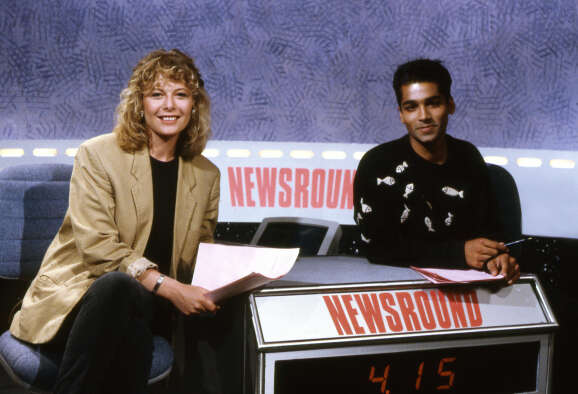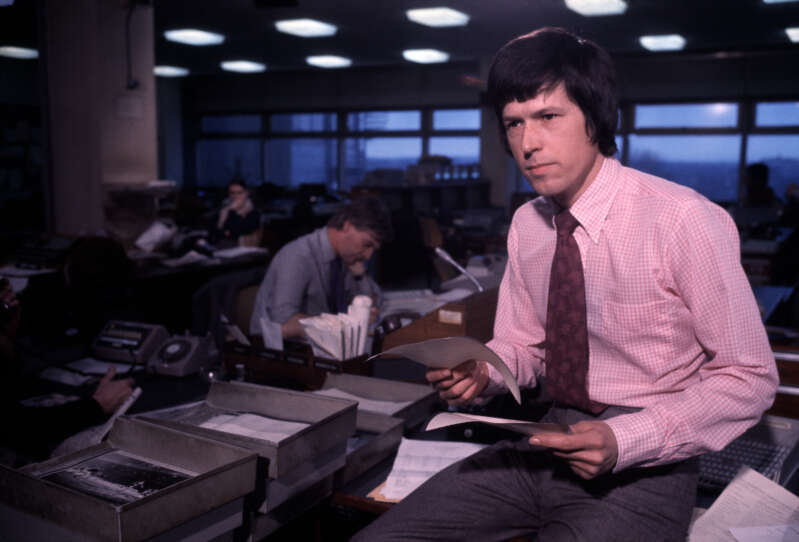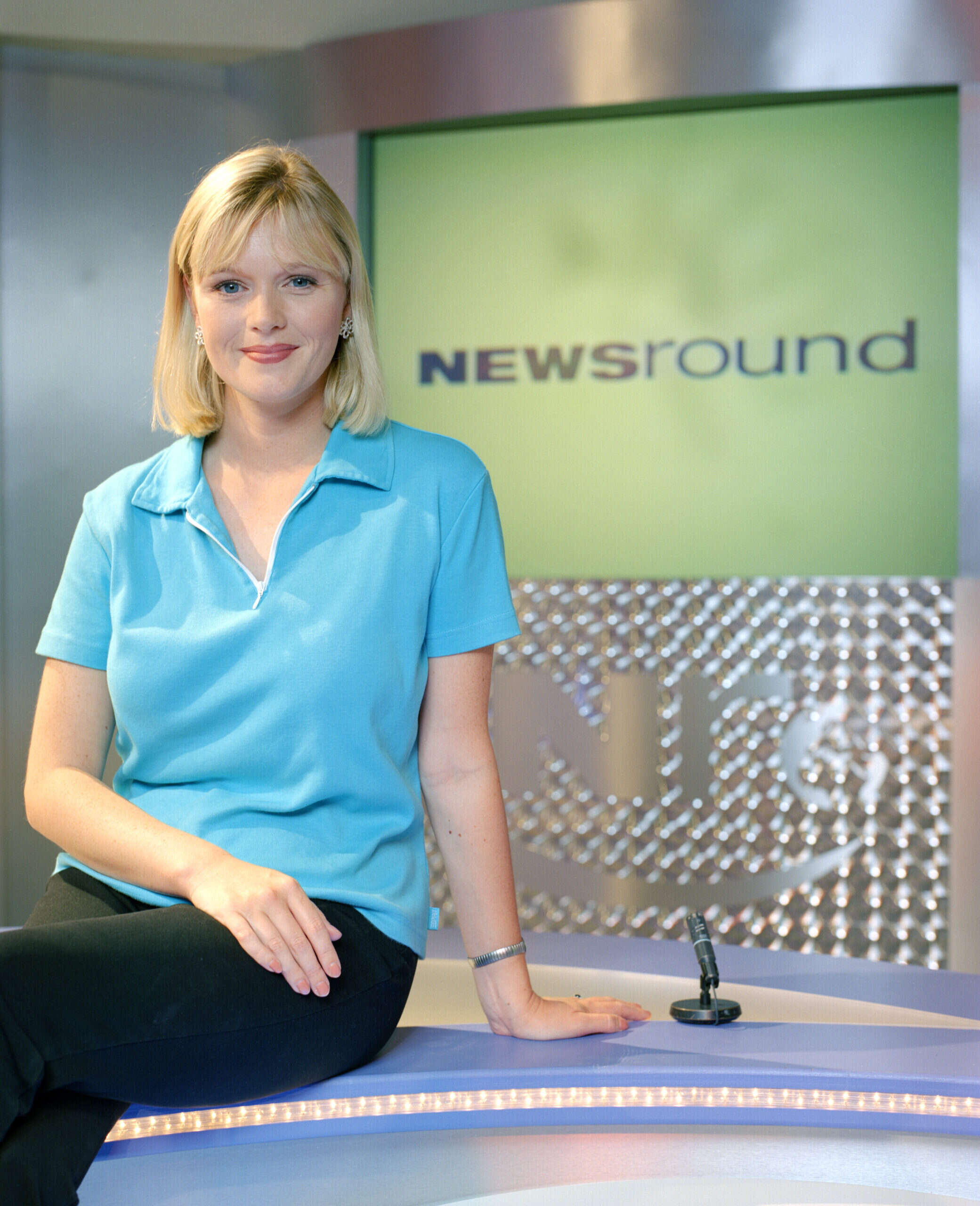
Some 50 years ago on Monday (4 April), John Craven hosted a TV first on BBC One: a news bulletin aimed at children.
Over the past half century Newsround has gone through several iterations, starting with daily ten-minute after-school bulletin on BBC One, later with several bulletins each day on the CBBC channel, and now, since 2020, one morning programme on CBBC supplemented by digital output.
To mark the anniversary, Press Gazette spoke to one of Newsround’s longest-serving presenters Lizo Mzimba (pictured, right), who fronted the programme between 1998 and 2008, and current editor Lewis James who joined the programme eight years ago.
Both praised Craven (pictured, left) as a “national institution” for his 17 years at Newsround. Then-deputy head of children’s TV Edward Barnes, who died in 2018 aged 92, came up with the idea but it was originally envisioned as an experiment that could have lasted just weeks.
Mzimba, who is now BBC News entertainment correspondent, told Press Gazette: “None of us would be doing this if it wasn’t for John Craven… if it hadn’t worked it would have been so easy for BBC to say children aren’t interested in news, that’s the end of it.”
He added: “For generations of journalists like me in front of and behind the camera we owe him a huge debt because of what he did – and much more importantly, what he did was enable generation after generation of children to understand the world about them in a much stronger, much better way.
“I literally can’t think of many examples of something that’s more important over the last 50 years.”
Newsround 50 years on
James said the present-day Newsround teams still follow the same principles set out by Craven and Barnes 50 years ago: “John was very clear in the early days that this was not just going to be a copy of adult news for children, it was also going to be news for children as well. It was going to be a place where children could have their say, have their opinions heard, and we’ve held onto that for the present day.
“There’s so much that those early teams did. They were keen that people from BBC News would do reports for Newsround but do them in a way that was right for children and we still do that now. We’ve had correspondents like James Waterhouse in Kyiv answer children’s questions about the tensions between Russia and Ukraine, and what was potentially going to happen.”
In 2020 Ofcom allowed Newsround to cut two of its three daily TV bulletins on CBBC, one in the morning and one after school, in order to invest more in its online output. The 7.45am bulletin was, however, extended from five minutes to eight.
James said the morning bulletin had become “much more important” because it was the one showed in schools, at the top of the Newsround website, and on iPlayer. He also said the extended length “gives us a lot more room” and capacity for big stories, or more linked stories about one major subject, as well as added more context.
He claimed he could say “with confidence” that the number of children accessing Newsround’s services is “much larger” now than ten years ago. More than two million children are now reported to be watching Newsround at least once a week at school, which James said was more than ten times higher than comparable figures from 2012, while weekly unique browsers to the Newsround website have risen from 140,000 to 800,000 over the decade.
Newsround currently has six presenters within a team of about 25 journalists working across its website, TV bulletin, specials and social media in a seven-day operation.
In the past two years they have had to work out how to explain the Covid-19 pandemic to children and, most recently, the invasion of Ukraine. In both cases, James said, Newsround’s role was to be a “trusted, impartial service that gives accurate information to kids” and equip them with tools “to be able to assess information themselves as well make up their own minds”.
According to James, Newsround’s online viewing figures went up by about 20% to 25% in the first three weeks after the Ukraine invasion began. He also cited “unprecedented” social media engagement and an increase in Newsround’s Youtube views of more than 300%.
‘You can’t shield children from the world’
Although it does not shy away from telling children about the difficult stories coming out of Ukraine, James highlighted several key ways in which Newsround coverage differs from the main BBC News: the worst facts such as death counts are not highlighted in headlines, volume of coverage is carefully balanced, and images of destruction may only be used from further away or graphics may be produced to illustrate a story instead as children are “particularly sensitive to distressing images”.
For example, using the story of sanctions against Chelsea FC owner Roman Abramovich was “a good way in” to the ongoing situation for one edition of the daily bulletin while giving children a break from the more distressing scenes in Ukraine. Newsround has also used its unique voice to report on child refugees fleeing to Poland.
James said: “I think it’s really important to us, this is important to Newsround’s history going back 50 years, that we’re not disingenuous with kids.”
He added that Newsround’s resources for children who might be upset by what they see in the news provide “honest reassurance to children. We don’t just tell them everything’s fine in the world, it’s all alright. But at the same time, we don’t dwell on things.”
During Mzimba’s time at Newsround he reported on the 9/11 and 7/7 terror attacks and travelled to Iraq in 2007 to report on how children were being affected by the war there.
Asked what he had learned about how to cover such difficult stories, he said: “The main thing at the forefront of your mind is you’ve got to be honest with children. You don’t want to unnecessarily upset or scare them, but you have to tell them the story that’s happening.”
He said it was important not to tell them “don’t worry, this isn’t going to happen again” but instead to say how rare attacks are and that the authorities are working hard to stop something similar happening.
“The crucial thing is that you just have to be as straightforward as you can with them, and you don’t need to give them all sorts of horrible, grisly facts that you might do if you’re doing it on the adult news.”
Mzimba added that “you can’t shield children from the world” as they would hear about the stories anyway – even before the internet. Therefore Newsround’s job is to make sure they hear about them “in a way that’s properly contextualised and in a way that they can trust is being done in a way that’s right for them”.
‘Brilliant’ training ground for journalists
The list of past Newsround presenters includes: Channel 4 News presenter Krishnan Guru-Murthy, ITV News at Ten presenter Julie Etchingham, BBC News chief political correspondent and Newscast presenter Adam Fleming, BT Sport football presenter Jake Humphrey, broadcaster and Strictly winner Ore Oduba, and many more well-known faces.
Explaining why Newsround is a “brilliant” training ground, Mzimba said: “You get to do a massive variety of stories and writing for children is, in many ways, a lot harder than writing for adults,” pointing to issues during his tenure like the Northern Ireland peace process and the Israeli-Palestine conflict.
Mzimba became well-known for reporting on Harry Potter and the phenomenon surrounding it earlier than many other outlets, to the extent he now feels like a “proud sort of distant uncle” to the three young stars Daniel Radcliffe, Emma Watson and Rupert Grint having seen them grow up into “three amazing, wonderful young people”.
Mzimba said many of his own highlights were “meeting a child who’s just done something unexpected or incredibly wonderful and different and you’re giving them a platform on national television”.

Juliet Morris and Krishnan Guru-Murthy on Newsround in 1991. Picture: BBC Pictures
Mzimba also praised Newsround for the diversity of its journalists from the early days, saying his predecessors such as Guru-Murthy and Terry Baddoo made him realise it was open “in a way that… not all journalism has been”.
“It just felt an entirely natural thing for it to do,” he said, “because they realised that their audience was incredibly diverse and wanted to see they were well reflected, and it just was an automatic thing – nobody forced them to do it.”
Newsround ‘led the way for others’
Newsround’s main competitors today are weekly newspapers First News and The Week Junior, Sky’s weekend news programme FYI, and online news service The Day.
Nicky Cox MBE co-founded First News 16 years ago and said Newsround had “led the way for others to follow”. She told Press Gazette: “Congratulations to Newsround on 50 amazing years bringing news to children.”
First News teamed up to show Newsround’s only TV rival, Sky’s FYI, on First News Education TV, its free online channel for schools. Cox said there are advantages to being independent of the BBC: “…we can campaign on behalf of children and give them a voice about the issues they care about most.”
Of other differences between First News and FYI versus Newsround, Cox added: “Newsround, I think, has to be over cautious. We understand that, if we ignore harder stories, children literally have the world at their fingertips now… Our job is to set the record straight with the truth, and to negate the anxiety and fear that children feel when they come across ‘fake news’.”
[Read more: How children’s news magazines have thrived during pandemic]
The Week Junior, which has an average weekly circulation of 91,295, launched in 2015 as a sister title to adult current affairs magazine The Week.
The Week Junior’s editorial director Anna Bassi told Press Gazette: “John Craven’s Newsround was a huge part of my childhood. I looked forward to my daily dose of news and loved the way he spoke directly to me about anything from the Falklands War to farmers’ protests, pocket money and puddings.
“More recently I’ve admired its evolution from daily TV news round-up to an unrivalled online offering. It’s a staple of the school day for many children and – like The Week Junior – Newsround continues to be regarded as a trusted, engaging, informative and reliable resource for anyone seeking to understand world events.
“I’d like to wish the team a very happy half century and to thank John Craven for sparking my own curiosity in current affairs. I hope both Newsround and The Week Junior will still be making sense of the world for children 50 years from now.”
Demand ‘will never go away’
Asked for his own message to Newsround’s future teams and audiences, Mzimba said: “Newsround has been so amazing over the past half-century and children’s news, news for children, is something that will never go away.
“However the broadcasting landscape changes there will always be a demand for it from children and it will always be an important wonderful thing to do… it will always keep going from strength to strength. It’s just too simple and brilliant a concept ever to die. And Newsround has always led the way on so many things and I know it’s going to do the same in the future.”
Pictures: BBC Pictures
Email pged@pressgazette.co.uk to point out mistakes, provide story tips or send in a letter for publication on our "Letters Page" blog




